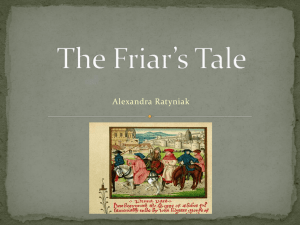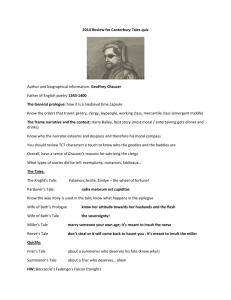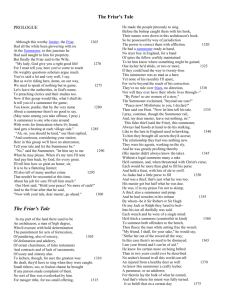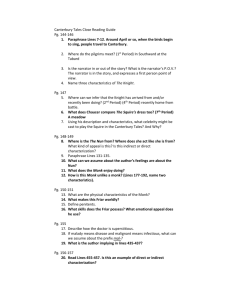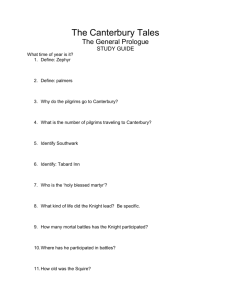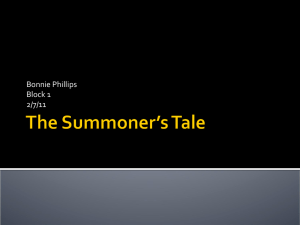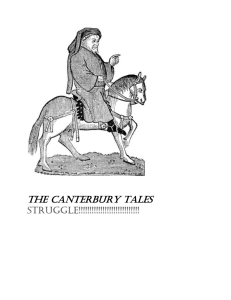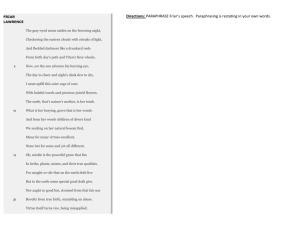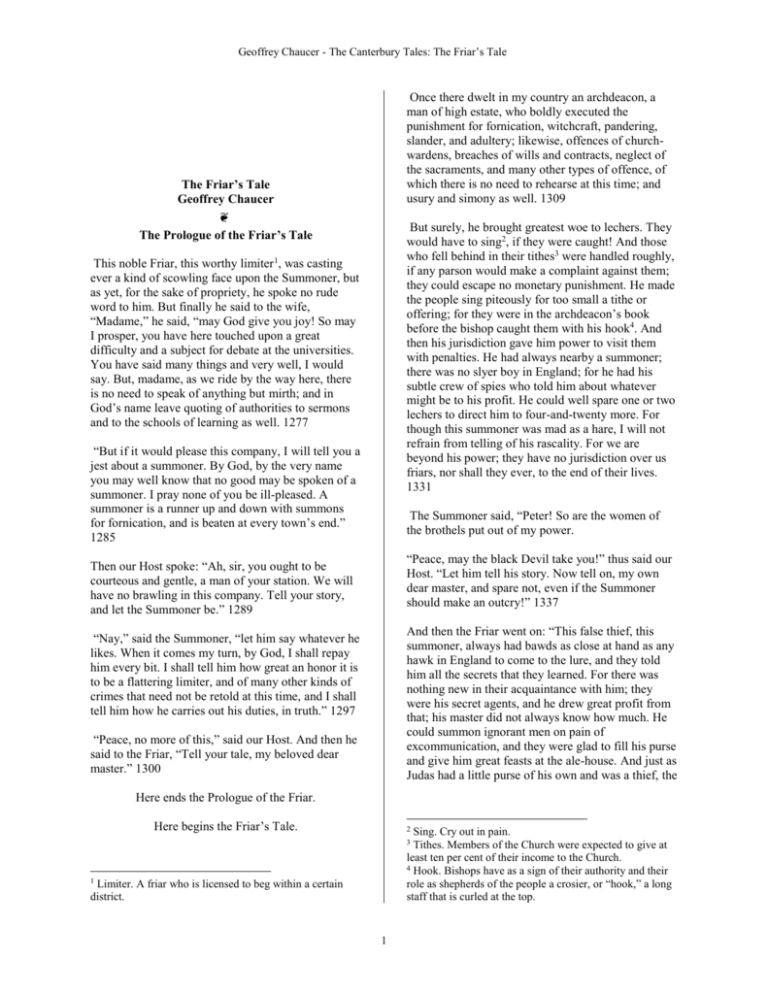
Geoffrey Chaucer - The Canterbury Tales: The Friar’s Tale
Once there dwelt in my country an archdeacon, a
man of high estate, who boldly executed the
punishment for fornication, witchcraft, pandering,
slander, and adultery; likewise, offences of churchwardens, breaches of wills and contracts, neglect of
the sacraments, and many other types of offence, of
which there is no need to rehearse at this time; and
usury and simony as well. 1309
The Friar’s Tale
Geoffrey Chaucer
❦
The Prologue of the Friar’s Tale
But surely, he brought greatest woe to lechers. They
would have to sing2, if they were caught! And those
who fell behind in their tithes3 were handled roughly,
if any parson would make a complaint against them;
they could escape no monetary punishment. He made
the people sing piteously for too small a tithe or
offering; for they were in the archdeacon’s book
before the bishop caught them with his hook4. And
then his jurisdiction gave him power to visit them
with penalties. He had always nearby a summoner;
there was no slyer boy in England; for he had his
subtle crew of spies who told him about whatever
might be to his profit. He could well spare one or two
lechers to direct him to four-and-twenty more. For
though this summoner was mad as a hare, I will not
refrain from telling of his rascality. For we are
beyond his power; they have no jurisdiction over us
friars, nor shall they ever, to the end of their lives.
1331
This noble Friar, this worthy limiter 1, was casting
ever a kind of scowling face upon the Summoner, but
as yet, for the sake of propriety, he spoke no rude
word to him. But finally he said to the wife,
“Madame,” he said, “may God give you joy! So may
I prosper, you have here touched upon a great
difficulty and a subject for debate at the universities.
You have said many things and very well, I would
say. But, madame, as we ride by the way here, there
is no need to speak of anything but mirth; and in
God’s name leave quoting of authorities to sermons
and to the schools of learning as well. 1277
“But if it would please this company, I will tell you a
jest about a summoner. By God, by the very name
you may well know that no good may be spoken of a
summoner. I pray none of you be ill-pleased. A
summoner is a runner up and down with summons
for fornication, and is beaten at every town’s end.”
1285
The Summoner said, “Peter! So are the women of
the brothels put out of my power.
“Peace, may the black Devil take you!” thus said our
Host. “Let him tell his story. Now tell on, my own
dear master, and spare not, even if the Summoner
should make an outcry!” 1337
Then our Host spoke: “Ah, sir, you ought to be
courteous and gentle, a man of your station. We will
have no brawling in this company. Tell your story,
and let the Summoner be.” 1289
And then the Friar went on: “This false thief, this
summoner, always had bawds as close at hand as any
hawk in England to come to the lure, and they told
him all the secrets that they learned. For there was
nothing new in their acquaintance with him; they
were his secret agents, and he drew great profit from
that; his master did not always know how much. He
could summon ignorant men on pain of
excommunication, and they were glad to fill his purse
and give him great feasts at the ale-house. And just as
Judas had a little purse of his own and was a thief, the
“Nay,” said the Summoner, “let him say whatever he
likes. When it comes my turn, by God, I shall repay
him every bit. I shall tell him how great an honor it is
to be a flattering limiter, and of many other kinds of
crimes that need not be retold at this time, and I shall
tell him how he carries out his duties, in truth.” 1297
“Peace, no more of this,” said our Host. And then he
said to the Friar, “Tell your tale, my beloved dear
master.” 1300
Here ends the Prologue of the Friar.
Here begins the Friar’s Tale.
2
Sing. Cry out in pain.
Tithes. Members of the Church were expected to give at
least ten per cent of their income to the Church.
4 Hook. Bishops have as a sign of their authority and their
role as shepherds of the people a crosier, or “hook,” a long
staff that is curled at the top.
3
1
Limiter. A friar who is licensed to beg within a certain
district.
1
Geoffrey Chaucer - The Canterbury Tales: The Friar’s Tale
very same sort of a thief was he; his master received
only half what was due him. 1352
“Mercy, by my faith,” said this summoner. And each
pledged his word in the other’s hand, to be sworn
brother until death. And they rode on their way in
pleasant conversation. 1406
He was, if I shall give him his full praise, a thief, and
a summoner, and a pimp. He had prostitutes also at
his call, who told it in his ear whether Sir Robert or
Sir Hugh or Jack or Ralph were with them, or
whoever it might be. Thus the prostitute and he were
often in partnership. And he would fetch a forged
mandate and summon both of them before the
chapter, and he would rob the man and let the
prostitute go. Then he would say to him, “Friend, for
my love to you I will have her stricken from our
black books; you need have no more trouble in this
matter. I am your friend, wherever I can aid you.”
1366
This summoner, who was as full of chatter as
butcher-birds5 of spite, and always inquiring into all
things, said “Brother, now where is your dwelling, if
I should seek you another day?” 1411
This yeoman answered him in a mild voice:
“Brother,” he said, “far in the north country, where
some time I shall see you, I hope. Before we part I
shall so well direct you that you shall never miss my
house. 1416
“Now, brother,” spoke this summoner, “I beg you,
while we ride by the way, since you are a bailiff as I
am, teach me some subtle trick and tell me faithfully
how I may gain the most in my office. And spare
nothing for conscience or sin, but tell me, as a brother
to me, how do you carry it out?” 1423
Truly, he knew of more ways of extortion than I
could tell in two years. For there is no hunting dog in
this world that can tell a hurt deer from a sound one
better than this summoner knew a sly lecher or an
adulterer or a concubine. And because that was the
best of all his income, therefore he set his entire mind
to it. 1374
“Now by my word, dear brother,” said he, “I shall
tell you a faithful story. My wages are very small and
restricted. My lord is hard and stern to me, and my
duties are very laborious; and therefore I live by
extortions. In truth I take all that I can get; at least all
that I spend I gain from year to year by cunning or by
violence. Truly, I can tell it no better. 1433
And so it happened one time that this summoner,
ever watching for his prey, rode to summon an old
widow, forging a case, because he wished to rob her.
And it happened that he saw riding before him under
a forest-side a cheerful yeoman. He carried a bow,
and bright, sharp arrows; he wore a cape of green,
and on his head a hat with black fringes. 1383
“Now surely, so I do also,” said this summoner, “I
never neglect to take something, God knows, unless
it is too heavy or too hot. What I can get secretly, I
have no manner of conscience about that. Without
my extortion I could not keep body and soul together.
And I will not be shriven6 for such tricks; I curse
these shrift-fathers, every one of them. By God and
Saint John, we are well met! But, dear brother, tell
me your name then,” said this summoner. 1445
“Sir,” said this summoner, “hail, and well met!”
1384
“Welcome,” answered this yeoman, “and every good
fellow too! Where are you riding you under this
green wood? Are you going far today?” 1387
“No,” this summoner replied; “near here is the
purpose for my ride, to raise a payment that pertains
to my lord’s dues.” 1391
And in the mean time this yeoman began to smile a
little. “Brother,” he said, “would you like to know it?
I am a fiend; my dwelling is hell. And I ride around
here to get what pickings I can outside the law, to see
whether men will give me anything. My pickings are
all my income. Lo! How you ride for the same
purpose, to win goods, you never care how. I do just
the same; for I would ride now to the end of the
world for a prey.” 1455
“Then are you a bailiff?” 1392
“Yes,” he said. He dared not, for the very filth and
shame of the word, say that he was a summoner.
1394
“By God!” said this yeoman. “Dear brother, you are
a bailiff and I am also. I am not known in this land. I
would ask you of your acquaintance and brotherhood
as well, if it woudl please you. I have gold and silver
in my chest; if you happen to come to our shire, all
shall be yours, just as you would like it.” 1402
5
Butcher-birds. Shrikes, which were believed to pin their
prey (insects) on thorns that were poisonous.
6 Shriven. Confessed or absolved. He will not go to
confession and confess his sins to priests.
2
Geoffrey Chaucer - The Canterbury Tales: The Friar’s Tale
The fiend answered, “No; sometimes we pretend,
and sometimes we arise with dead bodies in various
manners, and speak as reasonably and fairly as
Samuel did to Phitonissa9. And yet some will
maintain that it was not Samuel; I care not for your
theology. But of one thing I forewarn you, I do not
mock you. You wish by any means to know how we
are shaped; hereafter you shall arrive where you will
not need to learn about me, my dear brother. For out
of your own experience you shall be able to lecture
from a pulpit on this subject better than Virgil, while
he was alive, or Dante10 either. Now let us ride
quickly; for I will keep company with you, until you
forsake me.” 1522
“Ah, God Bless! What are you saying! I thought you
were truly a yeoman,” said this summoner. “You
have a man’s shape as well as I. Do you have then a
definite figure in hell, where you are in your natural
state?” 1460
“No, certainly,” he said, “not there. But when we
wish, we can take a shape upon us, or else make it
seem to you that we have one, sometimes like a man,
or sometimes like an ape or like an angel; I can ride
or walk in any form. It is no marvel that it should be
so; a lousy juggler can deceive you, and I know more
tricks than he does, by God!” 1468
“Why,” said the summoner, “do you ride or walk in
various shapes, then, and not always in one?” 1470
“No,” said this summoner, “that shall not happen. I
am a yeoman, as all men know, and I will hold my
word to you. For even if you were the devil Satan, I
would hold my pledge to my brother, as I am sworn,
and each of us is sworn, to be faithful brothers in this
matter. And we both are going about our pickings.
You take you your part, whatever people will let you
have, and I shall take mine. Thus we may both live.
And if either of us should have more than the other,
let him be loyal, and share it.” 1534
“Because,” he answered, “we will make ourselves
into such forms as are most fit to capture our prey.”
1472
“Why do you go through all this labor?” 1473
“For many causes, dear sir summoner,” said this
fiend. “But there is a fit season for everything. The
day is short, and it is past prime7 now, and yet this
day I have won nothing. I want to give my mind to
gain, if I can, and not to explain our deceptions. For
though I told them to you, your wit is all too bare to
understand them, brother. But yet, you ask why we
labor; sometimes we are God’s instruments and
means to do His commands upon His creatures, when
it pleases Him in various ways and shapes. 1486
“I agree, by my faith,” said the devil.” And with that
word they rode forth upon their way. And just as they
entered the outskirts of the town where this
summoner planned to go, they saw a cart laden with
hay, which a carter was driving forth on his road.
Deep was the mire, for which reason the cart was at a
standstill; and the carter struck, and cried as if he
were mad, “Giddy up! Brock! Scot! Why do you
spare yourselves for the stones11? May the fiend fetch
you, body and bones, as sure as you were born! Such
woe as I have had with you! Devil take all, horses,
cart, and hay!” 1547
“Truly, we have no might without Him, if it should
please Him to resist us. And sometimes at our prayer
we have leave to hurt the body only and not the soul.
Witness Job, for whom we made woe. And
sometimes we have power over both, that is to say,
over soul and body also. And sometimes we allowed
to tempt a man and to bring unrest to his soul and not
to his body; and yet all is for the best. When he
resists our tempting, it is cause of his salvation,
though our intention was to seize him, and not that he
would be saved. And sometimes we are servants to
man, as to Saint Dunstan8, the archbishop. And I was
servant to the apostles as well.” 1503
This summoner said, “Here shall we have sport,” and
he drew near the fiend secretively as if nothing were
the matter, and whispered in his ear, “Listen, brother;
by your faith, listen. Do you not hear you what the
carter says? He has given it to you: seize it
immediately, hay and cart and his three nags as well.”
1554
“No,” said the devil, “never a bit, God knows; that is
not what he means, trust me. If you do not believe
“Yet tell me faithfully,” said the Summoner, “do you
alwasy make new bodies thus out of the elements?”
1506
7
8
9
Phitonissa. The Witch of Endor. The story is told in 1
Samuel 28.8-25.
10 Virgil . . . Dante. Virgil: author of The Aeneid. Dante:
author of The Divine Comedy. Both include, as is
appropriate to the devil’s speech, trips to the underworld.
11 Stones. Why do you [the horses] let the stones, mud, stop
you?
Prime. 9 a.m.
Saint Dunstan. Archbishop of Canterbury, 961-88.
3
Geoffrey Chaucer - The Canterbury Tales: The Friar’s Tale
“Twelve pence!” she said. “Now may my lady Saint
Mary so surely help me out of care and sin, I do not
have twelve pence in my possession even if I should
gain this wide world. You well know that I am poor
and old. Show your charity on a wretch like me!”
1609
me, ask him yourself, or else wait a while and you
shall see.” 1557
This carter patted his horses upon the crupper, and
they began to stoop and pull. “Up, now!” he said.
“May Jesus Christ bless you, and all his handiwork,
great and small! That was well pulled, my own gray
boy! I pray, may God and Saint Giles12 save you!
Now my cart is out of the slough, by God!” 1565
“No, then,” he said, “may the foul fiend fetch me if I
excuse you, even if you perish for it.” 1611
The fiend said, “Lo, brother, what said I? You may
see here, the churl spoke one thing, but thought
another. Let us go forth upon our journey. I have
gained nothing here in giving up my claim to the cart
and the team.” 1570
“Alas!” she replied, “I am not guilty, God knows.”
1612
He said, “Pay me; or by the sweet Saint Mary I will
bear away your new pan for the debt you have long
owed me, what I paid for your penalty when you
made your husband cuckold.” 1617
When they came out of the town somewhat, this
summoner began to whisper to his brother;
“Brother,” he said, “there dwells here an old crone
who had almost as rather lose her neck as give a
penny of her goods. I wish to have twelve pence,
even if she should go out of her wits, or I will
summon her to our office, though I know no fault of
her, God knows. But since you know not how to gain
your living in this country, here take this example
from me.” 1580
“By my salvation, you lie!” she cried. “Never in all
my days, as a wife or widow, was I summoned unto
your court before now; nor was I ever anything but
faithful of my body! I would give your body, and my
pan also, unto the Devil black and rough!” 1623
And when the devil heard her curse so upon her
knees, he said, “Now Mabely, my own dear mother,
is this that you say your wish in earnest?” 1627
This summoner knocked at the widow’s gate. “Come
out, you old hag,” he cried. “I believe you have some
friar or priest with you.” 1583
“May the Devil,” she said, “take him, before he die,
and pan and all, unless he will repent himself!” 1629
“Who knocks?” said this widow. “God bless you!
God save you, sir, what is your sweet pleasure? 1585
“Nay, old cow, that is not my mind, to repent me for
anything that I have had from you,” replied the
summoner. “I wish that I had your smock and all
your clothing.” 1633
He said, “I have here a bill of summons. On pain of
excommunication see that you are before the
archdeacon’s knee tomorrow to answer for certain
matters before the court.” 1589
“Now, brother, be not angry, but in all fair dealing
your body and this pan,” said the devil, “be mine by
right. You must go to hell with me tonight, where
you shall know more of our secrets than a master of
divinity.” And with that this foul fiend seized him;
body and soul he went with the devil to the place
where summoners have their heritage. 1641
“Now,” she said, “may the Lord Christ Jesus, King
of kings, so truly help me, as I cannot! I have been
sick, and for many days,” she said; “I cannot ride or
walk so far, or it will kill me, so it pricks in my side.
May I not ask for a bill of the indictment, Sir
Summoner, and answer there through my proctor to
such a thing as I will be charged with?” 1597
And God, Who made mankind after His likeness,
save us and guide us one and all, and grant this
Summoner to become a good man. 1644
“Yes, pay me here on the spot,” said this summoner,
“let us see, twelve pence, and I will clear you. I shall
have only a small profit from it; my master has the
profit, not I. Hurry, give me twelve pence, and let me
ride away quickly; I can wait no longer.” 1603
12
And gentle people, said this Friar, if this Summoner
here would grant me the leisure, I could have told
you, according to the text of Christ and Paul and John
and of many other of our doctors of the Church, such
torments that your hearts might shudder; albeit,
though I might speak for a thousand winters, no
tongue can fully describe the pains of that same
cursed house of hell. But, in order that we may be
St. Loy. The patron saint of carters.
4
Geoffrey Chaucer - The Canterbury Tales: The Friar’s Tale
saved from that cursed pit, watch, and pray Jesus for
his grace so to guard us from Satan, the tempter.
Listen to this word, and beware. The lion lies in wait
at all times to slay the innocent, if he can; dispose
your hearts always to resist the fiend, who will make
you slaves and servants. He may not tempt you above
your power, for Christ will be your knight and
champion against him. 1662
And pray that these summoners may repent
themselves of their misdeeds, before the fiend may
seize them. 1664
Here ends the Friar’s Tale.
Translated and Edited by Gerard NeCastro
© Copyright, 2007, All Rights Reserved
Citation. Chaucer, Geoffrey. The Friar’s Tale. NeCastro,
Gerard, ed. and trans. eChaucer:
http://www.umm.maine.edu/faculty/necastro/chaucer
5

